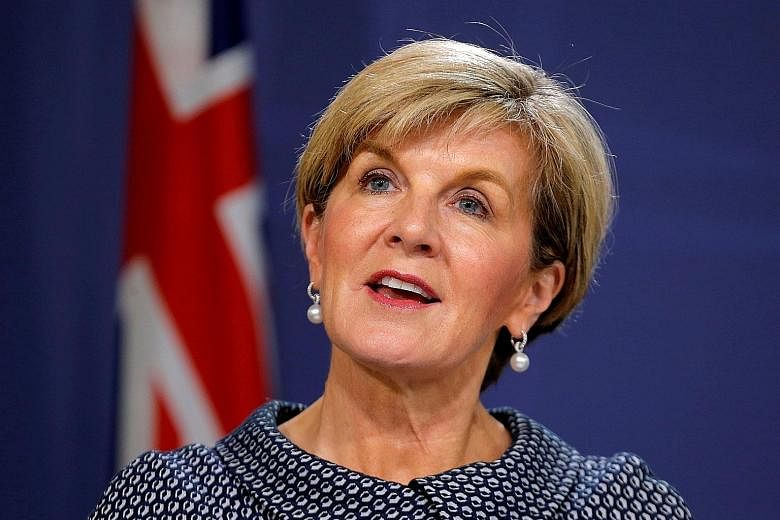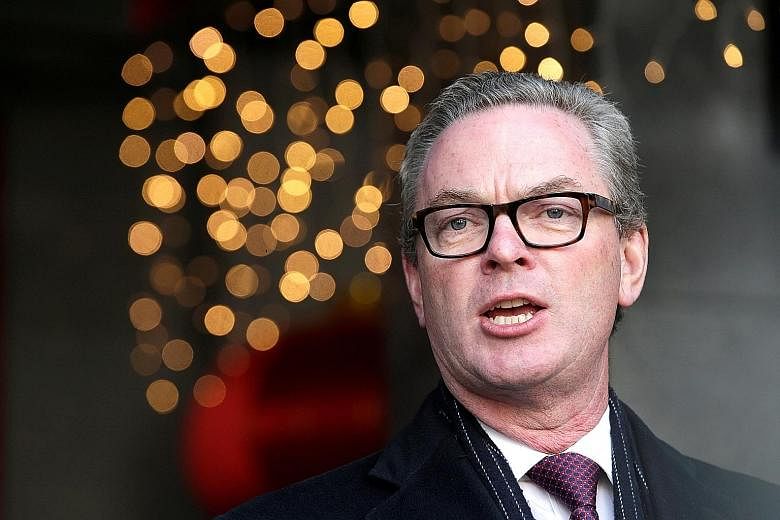Australian Prime Minister Scott Morrison has yet to call an election, but many of his colleagues in the ruling coalition already seem to have concluded that a loss to the Labor party is inevitable.
In an embarrassing show of no confidence in their leader's prospects, some of the coalition's highest-profile ministers and Members of Parliament have been quitting politics ahead of the next federal election, which is due to be held in May.
The growing group of retirees have largely claimed that they want to spend more time with their families, but they are also likely to have been motivated by a belief that they will otherwise have to spend the next term in opposition.
Several were angry and bitter about the infighting and backstabbing within the coalition that led to the toppling of Mr Tony Abbott and Mr Malcolm Turnbull as prime minister in succession.
Those exiting include former foreign minister Julie Bishop, defence minister Chris Pyne and industrial relations minister Kelly O'Dwyer who, at 41 years old, is one of the youngest Cabinet members.
The exodus has left the Liberal-National coalition without some of its most experienced MPs and is set to further dent Mr Morrison's election chances.
It has been a damaging distraction at a time when Mr Morrison desperately needs to reverse his poor standing in opinion surveys.
According to the most recent Newspoll survey, released on Feb 24, Labor leads the coalition by 53 per cent to 47 per cent.
The departure of Ms Bishop and Ms O'Dwyer added to concerns that the Liberal party has a "woman problem". Less than a quarter of Liberal MPs are women, and several MPs - including both Ms Bishop and Ms O'Dwyer - have criticised elements of the party for disrespecting women MPs.
Ms Bishop was the most publicly popular of the three leadership contenders during the party election to replace Mr Turnbull last August, but she received the fewest votes from her fellow MPs.
In an International Women's Day speech last week, Ms Bishop, the country's first female foreign minister, recalled being the only woman in Cabinet in 2013.
"I thought it was quite clear that we have some way to go in addressing the issues of gender equality and discrimination," she said.
Other ministers who resigned include former defence industry minister Steven Ciobo, indigenous affairs minister Nigel Scullion and human services minister Michael Keenan. Several coalition backbench MPs are also retiring.
Mr Ciobo, who is only 44, said he believed "it is time to move on to something else".
He was demoted by Mr Morrison last year, losing his trade portfolio after backing Mr Peter Dutton in the leadership contest.
"I've always said that politics is a means, not an end," Mr Ciobo told The Australian. "My decision not to re-contest wasn't decided by the events of last year."
Mr Morrison insisted the resignations did not indicate that MPs in the coalition believed it was set to lose the next election. He said he led a "very clear and stable team".
But Labor was quick to seize on the exodus, saying that it showed a lack of confidence in the Prime Minister.
"If the ministers in the government are giving up on the government, you should too," said Labor leader Bill Shorten.
Analysts say the departures show the enduring consequences of the recent internal party coups, which have become a staple of Australian politics but each time leave behind a trail of destruction and recriminations.
"The government's structure has been wrecked by the instability of three prime ministers in four years," wrote political commentator Malcolm Farr on news.com.au.
"The aftershocks of last August haven't faded… It was an episode of political pratfalls and arrogance, which has continued to infect the government with instability."
Indeed, the latest infighting followed an interview Ms Bishop gave her local newspaper in her home state of Western Australia earlier this month, in which she said that had she been Liberal leader, she would have beaten Mr Shorten in the coming election.
Political commentator Nick Butterly said the dispute had left the coalition "on the back foot again".
"Try as it might, the coalition cannot get clear air," he wrote in The West Australian.
"The government is fast running out of time to turn the ship around."


